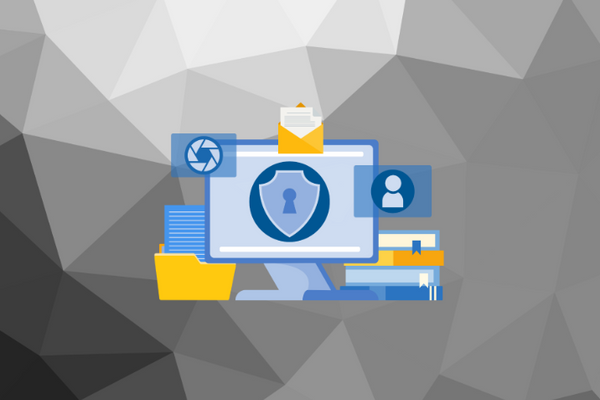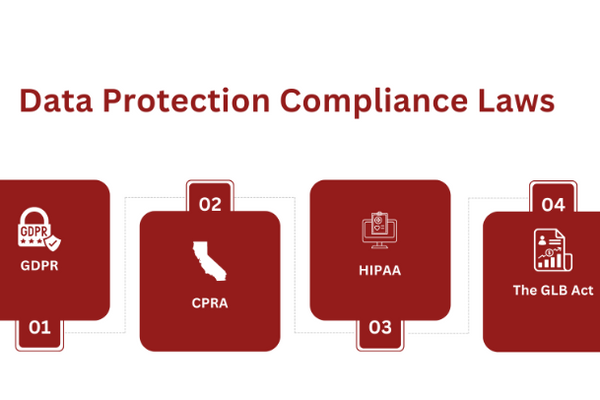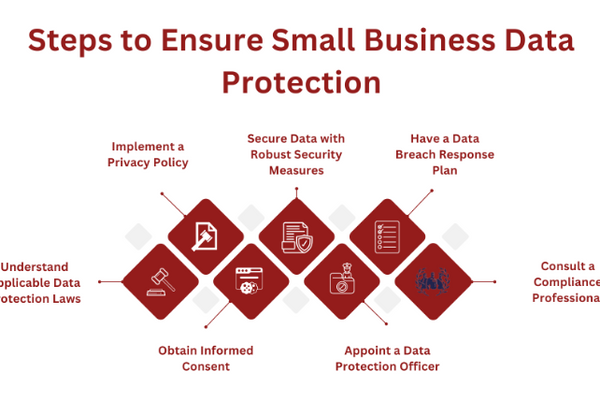
Small business data protection is essential to protect you and your customers’ information. Hackers and other security threats see small businesses as easier targets.
In addition, there are several laws and regulations in place that dictate how your business must secure the data it collects. Read our small business data protection guide to avoid fines, legal trouble, and inefficiency.
We will cover what small business data protection is and why it’s important, the regulations that dictate data protection for your business, and how to ensure your data is protected.
Let’s get started.
Key Takeaways
Your small business is at a high risk of data breaches and attacks, making data protection an absolute must. Failure to sufficiently protect customer data can lead to legal action and fines.
The primary compliance frameworks that create data protection regulations for your business are the General Data Protection Regulation, California Privacy Rights Act, Health Insurance Portability and Accountability Act, and the Gramm-Leach-Bliley Act.
To ensure your business’s data protection, you must understand all data protection regulations, implement practical training and privacy policies, obtain customer consent, secure your data, have a breach response plan, and consult a compliance professional.
What is Small Business Data Protection?
Screenshot 2023-09-10 094753.png

Data protection is a business’s defense against corruption, theft, breaches, and loss of the data they collect. Businesses must protect their data as well as the data of their customers.
Some common types of information businesses collect are email addresses and medical information, credit card information, and more, depending on the type of business.
Data protection practices for your business include security measures and protocols for all data interactions within your business. It will also include compliance with major data protection regulations, including the General Data Protection Regulation (GDPR) and the California Privacy Rights Act (CPRA).
Is it Important That My Small Business Practice Data Protection?
It is vital that your small business practices data protection. Small businesses are more likely targets and must pay extra mind to their data security. Your business puts its own and customer information at risk without data protection.
Customers will be less trusting of your business and less likely to complete any transactions if they feel their data is not secure. If their information is breached, your business could also face legal action from a customer.
Another important reason for your business to practice data protection is to avoid the fines and penalties for not complying with major data protection regulations. Compliance frameworks like the GDPR will impose hefty penalties on your business if you do not meet its requirements.
Data Protection Compliance Laws
Screenshot 2023-09-10 094824.png

It is essential to research and understand the requirements of significant data protection compliance laws in place. Here are the most common data protection compliance frameworks for your business to adhere to:
General Data Protection Regulation
The GDPR is one of the most prominent data protection regulations and protects all EU citizens. The GDPR sets regulations for all businesses that sell to and collect EU citizens’ data.
The GDPR has specific data protection principles that all businesses under its control must follow. The regulation also contains several data subject rights that your business must grant to its customers to avoid penalties and fines.
California Privacy Rights Act
The CPRA protects all California residents and their data. Any business that sells to and handles Californian residents’ data is subject to its regulation.
The CPRA also grants specific rights to customers, allowing them control over their data.
Health Insurance Portability and Accountability Act
HIPAA is a major legislation that dictates healthcare business and data protection for almost all Americans. HIPAA focuses primarily on regulating the safe handling of patients’ sensitive health information.
Gramm-Leach-Bliley Act
The GLB Act focuses on how businesses protect the sensitive financial information of their customers. The GLB Act focuses primarily on financial institutions like banks and lenders dealing with and storing customers’ financial data.
Steps to Ensure Small Business Data Protection
Screenshot 2023-09-10 094844.png

Your small business is potentially at a high risk of cyber security attacks. This is why you should make data protection a top priority. You can follow these steps to create a suitable data security system for your business.
Understand Applicable Data Protection Laws
The first step is to understand the legal requirements placed on your business by data protection regulations. Research and understand whether or not your business is under a regulation’s jurisdiction and all requirements of those data protection laws.
Implement a Privacy Policy
The next step is to create a small business privacy policy. Your privacy policy must outline how and why your business collects customer information and is legally required by many data protection frameworks.
Obtain Informed Consent
Informed consent is one of the many data subject rights given to customers by data protection regulations.
Your business must create a clear and informative description of your data collection processes and receive customer consent before moving any further.
Secure Data with Robust Security Measures
Your business should integrate security measures at all levels to protect you and your customers’ data. Your business can utilize data compliance solutions to ensure sufficient data protection that meets all regulatory requirements.
Appoint a Data Protection Officer
Depending on the size of your business and the amount of data you collect, you may be required to appoint a data protection officer.A data protection officer will be in charge of creating data security protocols and training for your business.
Even if your business does not require an appointed officer, the position can still help you ensure continued data protection compliance.
Have a Data Breach Response Plan
Having an action plan in case of a data breach is always a good idea. Your business must respond effectively to security breaches or data leaks, typically within 72 hours, to avoid legal consequences.
Consult a Compliance Professional
To assist your business in implementing data protection protocols and policies, you can enlist the help of a compliance professional. At Captain Compliance, we offer your business a full suite of compliance services.
Our team of compliance experts ensures complete compliance with all laws and regulations and can assist in every step of the data protection process.
Small Business Data Protection Tips
Data protection always continues and is never fully complete. Your business should always seek to update and optimize your data security system in any way possible. Here are some great tips to continuously improve your business’s data protection:
Compliance Training
Keeping all employees informed and well-trained in data security is always a great idea. Creating regular data protection training for all levels of your business is essential so employees are always prepared.
Your businesses can outsource compliance to professionals, like Captain Compliance, to assist you in creating effective training programs for your business.
Regular Risk Assessments
Performing regular risk assessments and audits of your business’s data security systems is crucial. Assessments can help you find potential security threats and minimize the possibility of a breach before it happens.
Regular Software Updates
To keep your data safe, your choice of software is of the utmost importance. You should regularly update the software your business uses to address any security risks and avoid bugs that could cause harm in the future.
Minimize Data
To even further reduce the risk of a data leak, your business should practice a minimalist approach to storing data. Keep your holding period as short as possible, and always dispose of old data effectively if you don’t need it.
Closing
As a small business owner, you are at a high risk of data security attacks and breaches. Data protection should be a top priority to avoid legal trouble, inefficiency, hefty fines from regulators, and a bad reputation with customers.
At Captain Compliance, our team of compliance professionals can help your business at every step of your data protection journey. We can help you create and implement effective policies and procedures that ensure your compliance with all relevant data protection regulations.
We will handle all your business’s compliance and risk management, so you don’t have to.
Get in touch with us today to learn more about our full suite of compliance services and what we can do for your business.
FAQs
What Security Policies Should a Small Business Have?
Small businesses should have data backups, password protection, breach response plans, and employee training policies.
Learn more about compliance training solutions
What Is the GDPR Policy For Small Businesses?
The same data privacy and penalty rules apply to small businesses as large businesses. GDPR has 99 articles of specific rules, principles, and recommendations for businesses to make.
Learn more about implementing GDPR-compliant procedures into your business
Is GDPR Optional For Small Businesses?
Your business is required to follow the regulations of the GDPR if you collect and store customer information from the EU.
Contact us to ensure your compliance with all GDPR requirements
What can my Business do to Protect Data?
Your business should have a practical risk assessment, training, breach response, and information security programs.